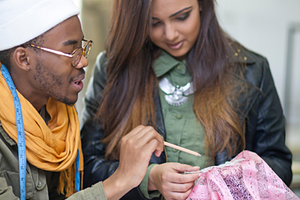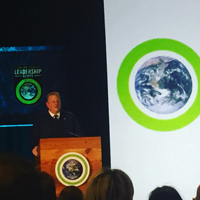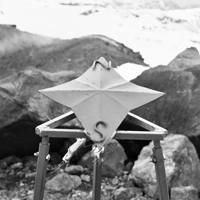
Just in time to remind us all about shopping consciously and sustainably this holiday season, on November 21, 2014, the Cradle to Cradle Products Innovation Institute named its Fashion Positive launch partners, including G-Star RAW, Loomstate, Bionic Yarn, Saitex, and Stella McCartney.
Cradle to Cradle Products Innovation Institute launched Fashion Positive as the first and only comprehensive program that helps fashion brands, designers and suppliers continuously improve how clothes are made—what resources are used, and where it all goes after use in order to make a positive impact on the environment, the economy and society. The program helps fashion businesses look at five categories: material health, material reuse, renewable energy, water stewardship and social fairness.
Using Cradle to Cradle framework developed by Dr. Michael Braungart and William McDonough, and the requirements of the Institute’s Cradle to Cradle Certified™ Product Program, Fashion Positive brands and supply chain partners can develop truly innovative products and materials to transform the fashion industry and the world.
Fashion Positive is powered by Cradle to Cradle Certified™, the most comprehensive program in the world that guides designers and manufacturers to make products in fundamentally better ways. Their standards of certification ensure that companies achieve the highest criteria in quality fashion and begin to harmonize with existing industry measurements and programs, like the Sustainable Apparel Coalition’s Higg Index, Environmental Profit & Loss and Natural Capital Accounting.
Once sustainable materials are identified, they will be placed in the program’s Materials Library. By 2016, Cradle to Cradle Certified™ GOLD-level standard will be implemented, in part due to the work provided by McCartney and G-Star.
“We are excited to partner with these industry leaders who are on the cutting edge of fashion design and manufacturing,” said Cradle to Cradle’s Lewis Perkins, SVP of Fashion Positive. “Together, we are expanding a vision within the industry that is abundant rather than resource-constrained. We are creating beautiful, must-have clothes made in such a way that everything and everyone along the supply chain has been optimized for a better future.”
Taking a deeper, Bionic Yarn, for example, one of the leaders in sustainability fashion, has partnered with Parley For the Oceans and are recovering plastic waste from shorelines around the world and transforming it into high profile fashion garments. Bionic Yarn is now working with Fashion Positive to optimize a Cradle to Cradle Certified™ closed loop material reuse strategy for products made with Bionic Yarn materials.
The objectives of Fashion Positive include:
- CIRCULAR ECONOMY MODEL: Create healthy and safe fashion materials that can be effectively recycled (or upcycled) or re-used.
- EXPERTISE: Fashion Positive connects companies with experts and their global network of accredited assessors at each step of the innovation process, from idea to finished product.
- INNOVATION FUND: The Fashion Positive initiative provides funding to select brands and suppliers to develop the next generation of forward-looking materials, products and quality practice.
- MATERIAL HEALTH: Fashion Positive will create a resource library that will index inventive fabrics, dyes, trims, thread and more that meet the Cradle to Cradle Certified™ Product Standard, making it easier for fashion brands and designers to source trusted, certified materials.
Fashion Positive is a much-needed program in helping to make the industry a powerful tool for change. Unknown to most consumers, the fashion industry is one of the most toxic industries other than the fossil fuel industry. According to the Natural Resources Defense Council, each year, three billion tons of soot is released into the air due to textile production in China alone.
Take a moment this holiday season and think before you buy. Ask what your apparel and footwear are made of, can they be recycled, and look for sustainability strategies in the brands you buy from.


